 |
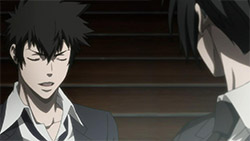 |
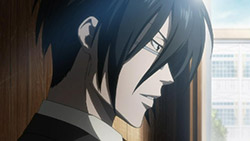 |
 |
 |
 |
 |
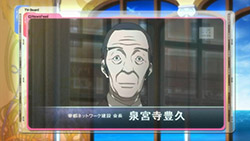 |
 |
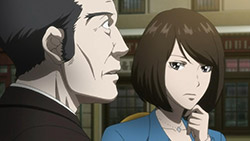 |
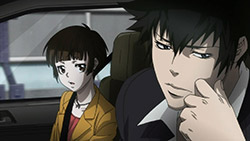 |
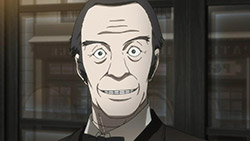 |
 |
 |
 |
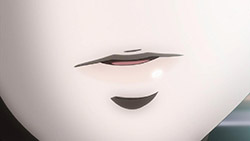 |
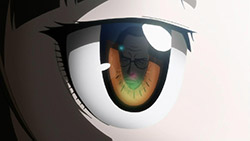 |
 |
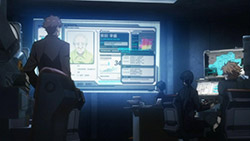 |
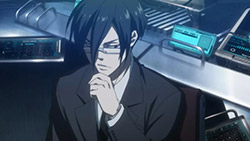 |
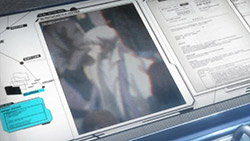 |
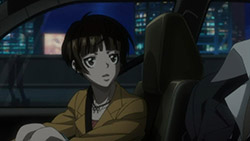 |
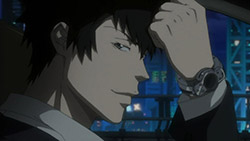 |
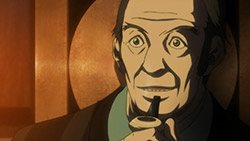 |
 |
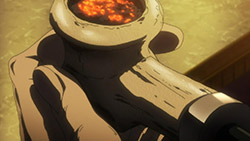 |
 |
 |
 |
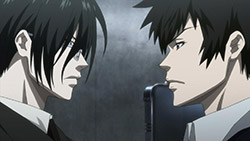 |
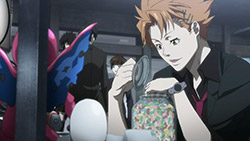 |
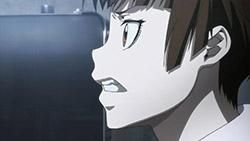 |
 |
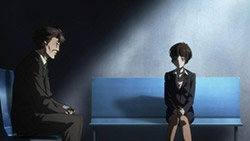 |
 |
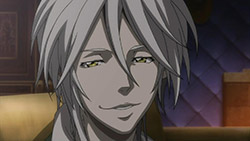 |
「楽園の果実」 (Rakuen no Kajitsu)
“Fruit of Paradise”
Even the lull before the storm somehow manages to be more thought-provoking than most episodes of other shows. However, while some of the issues that are brought up in PSYCHO-PASS are connected in one way or another to Sibyl, lately it seems like other dystopian ideas unrelated to the Crime Coefficient system are also being explored by the show.
One of these ideas in particular hits close to home because of how immediately relevant to our world it is. With this being a sci-fi series set one hundred years in the future, it was inevitable that a number of advanced technologies have been introduced, some more crucial to the plot than others. Several of these technologies such as holo clothing seem very much out of reach to the point of being in the realm of fantasy still, but other technologies seem like a logical and natural progression of our own. A good example can be found in this episode in the televised interview with Senguji Toyohisa (Chou Katsumi), who apart from his nervous system, is completely made up of cybernetic body parts. Given one hundred years of medical advancements, it’s not too hard to imagine that there will be people who are able to achieve some measure of immortality, or at least as long as their wallet allows. Yet like with any new technology that has a significant impact on the world, there are the philosophical questions that follow, especially when the technology in question deals with the fabled ideal of immortality itself.
Since the last time we saw Senguji he was mercilessly decapitating Ouryou Rikako with a hunting rifle for pure sport, many of us were probably rooting for the interviewer to somehow knock him off his pedestal and put him in his place. While the poor lady did have some good questions and rebuttals, she seemed to back down too easily and left some questions on the table that probably would have really challenged him.
Senguji claims that since she has a portable information terminal, holo clothing, home automation and AI secretary, and that since she would unable to do work without them, she is also a cyborg to a certain degree as well. Yet that would mean that many people today would be considered cyborgs too, since they carry smartphones that are capable of information and home automation at their fingertips. There are also rudimentary beginnings of an AI secretary in Siri and Google Now as well. Despite all this technology pervading people’s lives today, it’s highly probable that none of them would ever claim to cyborgs. Even if all data were lost people were no longer able to use their technology, they would still be able to function as a normal human beings. People can still walk, talk, etc., without the help of technology. Senguji’s argument is flawed because he’s basically saying that any piece of technology that is essential to doing work like books or eyeglasses makes people cyborgs.
The line where cyborg should be delineated is when the loss of a cybernetic component leads to the loss of a basic human function. In Senguji’s case, if any part of his cybernetic system were lost and no longer usable, he would lose some of these functions. It’s not simply a question of the degree of “cyborgization” or “cyberization”, as he calls it.
Cyborg definition aside, the real question is about the value of the immortality that Senguji is trying to attain with his cybernetic body. It’s a question of how much of our humanity is tied into the inescapable knowledge that we are mortal beings. Even Makishima alludes to this when he says, “The energy that comes from thrills… It’s a dangerous reward that goes hand in hand with death […]”. There are simply certain aspects of our humanity, like certain emotions and certain behaviors, that only exist because we know we are mortal beings with mortal bodies. Perhaps this is why Senguji came to enjoy hunting other people for his thrills – he knows he cannot use his own immortal body for them.
One can’t help but also feel that some part of humanity is lost with an artificial body and a brain that is increasingly dependent on artificial stimulation and pleasure, even if the end result isn’t immortality. Is a body where it is difficult to tell where a human ends and an AI begins, worth it?
Senguji embraces technology to the furthest extent possible, and he seems to have lost much of humanity and replaced it with depravity. In contrast, Kougami’s former teacher Saiga Jouji (Yamaji Kazuhiro) is a professor of clinical psychology and an expert criminal profiler who, because of the nature of his work, has come to eschew much of the technology that has come to define PSYCHO-PASS’s society, and has become more in touch with certain aspects of humanity as a result. By focusing on humans and not technology, he’s able to uncannily profile Tsunemori to a degree and accuracy that seems to at least match what Sibyl is capable of, if not beyond, at least judging from her reaction. It’s just a shame that something so human as being able to read body language and various other psychological signs can potentially cloud Hues and raise Coefficients. This is yet another example of how technology like Sibyl can be detrimental to our humanity.
In the span of one episode, which is probably just the setup for Kougami’s showdown with Senguji, PSYCHO-PASS still manages to explore the effects of technology on our humanity by comparing and contrasting two men who lie at the opposite extremes. It all definitely makes for compelling content, but the verdict is still out whether the inclusion of these other dystopian issues unrelated to Sibyl itself makes for a good narrative. At the very least, it does give viewers food for thought, so that they may exercise their minds to keep them young and healthy. Coincidentally, that is what Senguji really wants, right?
- Candy dressed up as Sherlock Holmes was pretty awesome. After all, this is a detective show too, and a comment in the previous episode makes an interesting theory that connects the two series quite well.
- Also loved Tsunemori having the (metaphorical) balls to stand up to Ginoza, who seems to carry a lot of emotional baggage and manages to anger or alienate practically everyone on his team.
- All Tsunemori’s blushing before and during their “date” has to mean she has some feelings for Kougami, right?
- Saiga has a very good taste in architecture because he lives in a recreation of one of my favorite houses, American architect Frank Lloyd Wright’s Fallingwater. Color me extremely jealous!
- How depraved is Senguji to make a set of tobacco pipes out of Rikako’s bones? This is really messed up stuff right there.
- Wonder why Makishima smiles at the thought of Kougami. Is it because he wants Kougami to be his next “project” like Rikako and Senguji, and he feels that Kougami has the potential to be his best “project” yet?
- Full-length images: 01, 02.

I’m pretty sure Kougami will get framed by the bad guy and he might be unaffected by the Dominators because he’s PP level is low. Kougami might aim himself and dodge to kill that guy.
He won’t need to do that, we already saw how physically strong Kogami is, i mean he crushed a mechanical training bot with his bare-hands … if his Dominator doesn’t work he is just going to use his fists and bury them in Makishima’s face.
Go watch the battle at the start of ep1 to see what Kogami would do if his Dominator gun doesn’t work XD
All I see was him using his physical strength to remove the assailant mask, throw him out and fire his Dominator.
@Cybersteel
Well, that’s the whole freaking point, he cracked that soldier’s helmet with his physical strength and threw him outside the building .. shooting him with the Dominator was just overkill .. the guy was already going to die from the fall anyway.
Point is, Kogami can handle situations where his Dominator doesn’t work with pure physical prowess instead .. he doesn’t need any weird tricks.
But weird tricks are cool. I really can’t imagine Kougami killing Masashima with his bear hands.
This anime is so great at being thought provoking and interesting. I wish there were more anime like this that got to 26 or 52 eps T_T
it can go up to 52 episode depend on how well it sale but it didn’t plan for in the 1st place , well this show have potential just like Ghost in the Shell
26 is more than enough. Anything more would probably mean the scriptwriters would have to recruit the use of fillers, or stretch things out thin. Either way, it would mess things up.
Can’t say PP doesn’t do its job of being thought-provoking, but that’s only because viewers like to delve deep into their anime, proof being the discussions being held here. I doubt the producers have thought about or understand half of the issues that they’ve presented throughout the series.
Human bone pipes: classic! I really love the murders in this show: totally revolutionary and stylish.
I wonder who’s the idiot who made Sibyl: understanding criminals is what makes it possible to stop them. WTF is with restricting their rights just because they have the capacity to do crime? Everyone does!
Totally agree, that old, cyborg man (right now, I am not sure he is a man anymore) is just creepy. Why did they have to show his disturbing smiling face again, and again? But enough of that, O.M.G Ouryou’s bone!! WOW! just wow, I really did NOT see that coming, not at all!! the sweet sweet irony — she become a art work as well.
Too emphasize how in his pursuit of immortality he’s lost his humanity. Even in just trying to superficially look like a normal person in front of the camera’s, he can’t even pull that off anymore. If I was to take a guess, his thing is that he enjoys hunting people. Being a cyborg perhaps gives him a sense of power over his prey. Seeing as how man has been decorating the remains of their hunting trophies since the dawn of time, I doubt he even considers himself human anymore.
Motoko (GitS) would heavily disagree with you, especially after that episode where they were tracking half-cyborg veteran guy who was thinking and dreaming of murdering his boss.
yell that to Minority report too and you will end up in ice prison lol
Do those holo-clothes actually provide warmth and the feeling of being clothed? Just a thought. =P
No, they’re all depraved exhibitionists.
Are they even hologram: She was touching them.
Candy dressed up as Sherlock Holmes links to a close up picture of Akane’s lips.
Just an fyi.
You can’t blame him. Dem lips man.
Fixed, thanks for pointing that out. Guess it’s what I get for writing this post at 5am, lol
I like how Akane handed a big pile of BUUUUUURN on Gino. I understand where Gino is coming from but Akane’s right, there’s no point on being on law enforcement if you don’t do anything and let your subordinates do the work. In hindsight SYBIL makes the job of law enforcement more dangerous since there is a very real risk of raising one’s coefficient.
Senguji is definitely creepy. I like how he looks uncanny even when he’s casually spouting philosophy. Its a great way to show he’s not entirely human, though I have to wonder how someone twisted like him can bypass Sybil despite his public appearances.
It’s really freaky how that guy never blinks.
I can’t help but feel this was done inentially by Senguji cuz it wouldn’t to much work put in a subroutine that would have his eye blink everyone in a while even if they don’t need to.
http://tvtropes.org/pmwiki/pmwiki.php/Main/SherlockScan
Saiga basically gave Akane the Sherlock Scan.
Pretty interesting comparison to Sherlock Holmes, as highly observant detectives like Holmes would have been classed as “Latent Criminals” by Sybil should they be careless with their mental wellbeing. Though rather than a psychopath, Holmes is more a “high-functioning sociopath”, as the present-day BBC version of Sherlock would claim himself to be.
Another interesting societal change with the advent of the Psycho-Pass system is that it has rendered universities redundant in their roles in educating people to suitable careers in society, as that role has been usurped by the Sybil system, which basically parses each individual with their “most suitable career” (or doom them to a life of confinement) based on a scan on their mental statuses.
It makes sense for Makishima to have been a student of Saiga, having dabbled in the “Dark Arts” of psychological profiling allows him to masterly exploit the loopholes of the Sybil System, making him a “Moriaty” of sorts, a “Consultant Psychopath”, in contrast to Kougami’s Holmes-like qualities.
http://www.nicovideo.jp/watch/sm19337040
A bit off-topic, and I posted this in the Robotics Notes thread as well, it’s basically Hanazawa Kana (Akane) reading out the synopsis of Psycho-Pass…… in English. (Followed by Nanjo Yoshino for Robotics Notes, which she stars in. )
“I HOPE YOU KEEP WATCHING!” XD
(There was a YouTube link, but Big Brother has taken it down, so I only have the NicoNico link to provide for. Registering for NicoNico is very easy and it’s free, especially now that it has English-language support. Having a NicoNico account is recommended for any anime fan if they want to check out the latest fad anime videos from Japan. )
Rikako is smokin’ hot, even in death.
Great ep. Senguji vs. Kogami is essentially a win-win for Shogo; if Senguji wins, he rids himself of a nuisance, and if Senguji loses, Kogami is even more worthy of being manipulated.
They arent even trying anymore, with those horrible facial expressions doesnt even resemble human. Bad animation. P-P dropped!
The only weird facial expressions that I saw from Toyohisa but that’s because he’s a cyborg.
You can’t possibly be serious .. no way in hell you don’t get the fact that they are doing this (making his facial expressions creepy/unusual/right in the uncanny valley) intentionally to show that Senguji Toyohisa has lost part of his humanity when he became a full cyborg .. they have been doing this since he first showed up to hint at the fact that he isn’t 100% human.
Did I just hear you say something Production I.G created had bad animation? Its astounding to even think how you even keep a show around long enough to watch it to the end if you drop it so quickly and easily over something so mundane (which by the way never existed in the first place “the horrible face expressions” you’re talking about this ep that is)
What bad animation? This anime is a candidate for best of the season so I really can’t see your perspective.
TQ
he is just too stupid but not admit it
This.
This show has been awesome so far and visually stunning.
Not sure if trolling or not…
OK now, the show is positively AWESOME… we get to explore/discuss cyborgization in addition to Sybil system and we get some light shed on next psychotic individual tutored by Makishima.
I wonder how he managed to get a weapon in age of thought policing. Now we can witness a most dangerous hunt yet, when the prey is armed too… hey but who’s the hunter and who’s the prey in this one?
Makishima might be trying to be a social darwinist here, trying to get the best killer to survive – and use him later…
The whole Cybernization thingy reminds me of Yatzhee’s review of Deus Ex Human Revolution.
http://www.youtube.com/watch?v=8oE54GSVxUQ
Tsunemori probably fell for Kougami’s abs 😉
I love Fallingwater! It was pretty exciting to see it in the anime. Putting aside the fact that I barely scraped through the design course (and can barely remember details of Fallingwater), I would still be upset if they simply copy pasted the architecture into the episode just because it’s suitable and looks nice. I hope there is a proper exploration/meaning behind having a similar design other than aesthetics.
Hmmm ….so Makishima worked at the all-girls school. Teachers saw him, students saw him, but they couldn’t get a description/sketch of him? All that was said in the anime was that he used the identify of another person, not a holo. What’s up with that?
Good point, they said they tried drawing a sketch for him but it didn’t work for some reason .. maybe he erased himself from people’s memory too somehow .. if all people have cybernetic implants maybe that’s kinda possible.
I thought that too, but really, is he that good? Seems to be the perfect villain. Curious how they got the blurry image of him long ago; did he do that on purpose?
@Nugester
He isn’t perfect, but he is very resourceful, the Chinese guy with him seems to be a master hacker and we saw what he did when he mass-hacked all the hologram disguises in the club few episodes ago .. so maybe he had something to do with this.
As for the blurry image, i’m sure there is a story behind it, but all we know for know is that it’s what got Kogami’s enforcer and friend Sasyama killed brutally and turned into grotesque art .. i guess he managed to get that picture of Makishima somehow and then Makishima set his sights on him (like he is doing with Kogami now) and killed him (of course killed him through a proxy like he always does).
Immortality is fools gold. Even stars burn out. With that said I can see science coming up with ways to prolong our individual lives. Humans as a race have already found a way to be immortol through reproduction.
It’s like with Dio although who was an immortal zombie/vampire, Jojo with his offspring of generations has a longer legacy than Dio ever will.
That reminds me. I need to catch up with Jojo. How many episodes are planned?
Saiga was pretty much using the same technique that Sherlock Holmes used to profile people, i’m liking all the Sherlock Holmes references here and there (including the cute holo-octupus dressing as Sherlock Holmes).
Also one of the commentators here made a nice analogy between PP in general and Sherlock Holmes .. it kinda makes sense considering how the series itself is referencing Sherlock Holmes now in various ways .. being a detective story and all XD
So,would the rundown of Sherlock Holmes characters to Psycho Pass parallels be like this?:
Sherlock Holmes -> Kougami
John Watson -> Akane
Prof. Moriarty -> Makishima
Inspector Lestrade -> Ginoza
the Latent Criminals at the correction facility last episode -> Baker Street Irregulars
Just missing Mycroft (Saiga is close fit but not quite) and Irene Adler, I guess.
Maybe Mycroft = Sasayan
Sherlock in Sybil system probably would end as inmate in the “psychically dangerous” asylum – he was cocaine addict, for example!
Glad they’re keeping up the quality of the past arc. I’m even happier that they’re finally giving Gino some much need history. He finally acted like an actual character instead of the “stern, inflexible cop.”
Kinda wished that Saiga would have gone into what his observations were that led him to those conclusions; but still, if it’s one thing I do consistently enjoy about this series, it’s how they pair those who solve crimes and those who commit them.
In my opinion, Senguji made a weird comparison with the cyborg thingy. It would have been more interesting if he compared himself to people that have an artificial hip, pacemaker, an implant (for example: deaf people who got an implant so they were able to hear again) or even glasses.
Dear Verdant. You usually have some good point in your post. Yet, I’m afraid your effort in proving that we are not cyborgs kind of miss the point of the cyborg narrative.
The Cyborg Narrative, as highlighted by Donna Haraway’s cyborg manifesto in 1985, was only partially concerned with “replacing our mortal body or “radical enhancement”. Rather, it’s about how the boundary between human and technology (machine) started to blur (in other words, how we interact ever more intensively with technology and how our dependence on them grow), and the consequences of that blurring.
If we look at things in that light, many of us are cyborgs now. According to a narrow definition, people with implants (such as artificial heart etc.) are cyborgs. Looking at a wider definition, since you and I are having this exchange through the mediation of Information Technology (internet and computers), we are cyborgs in this particular setting.
I do agree with you that through merging with technology, our prospective on the world and on being human changes. The reason why I think the wider definition of cyborg is relevant is because such change does not start after one became a full body cyborg, such as Senguji Toyohis. Rather, it started off with very basic level of cyborgization, Even basic things like having a heart implant or simply interacting through computer network would have quite dramatic impact on our world view. And tracing that change and its effect on us is the subject of cyborg narrative.
On a separate note, I don’t see the Sibyl and Professor Saiga Jouji as on opposite side of things. Rather, I’d see Sibyl as a radical development of the Professor’s method. As at the end of day, they all boil down to strict casual relationship. ie. we can deduct A from B.
The trouble is, strict casual relationship does not exist in regard to human behaviour. For example, modern lie detectors can detect signs relating to the arise of particular emotion quite accurately. Yet, the very same emotion can arise according to multiple reasons. For example, one people can fear about their lie being caught out, but another can also fear about their innocence or honesty cannot be proved. Yet, for a lie detector following strict casual relationship, fear = lying and both people would look the same and be labeled as liars.
Strict psychological analysis, performed either by human or machine, would fail because this problem (for all purposes Sibyl runs an algorithm based psycho-analysis). If the professor can preform better than the Sibyl, that is not because his human based analysis is better. Rather, it’s because he is more flexible and can apply something on top of scientific psycho-analysis: namely human intuition and empathy.
summed up cyborgs nicely 🙂
Also can’t agree with verdant on the idea that people will be able to function as “normal human beings” without technology. Well, at this point anyways. Civilization is very much dependent on it.
Very nicely put!
I thought they showed pretty well, that this exact problem still exists within the Sibyl system. If you remember, in episode 1, the hostage showed a high crime coefficient, not because of high aggression levels, or some kind of conscious intent to hurt anybody, but because of her natural self-preservation instinct( in my opinion anyway). As you said, feeling scared is not the same as feeling guilty.
That’s why it still find it quite shocking how this society can put so much trust into a system, which, within a minute, can issue and then revoke a death sentence upon a human being.
Oh sorry, I’m not familiar with the Cyborg theory. Yet isn’t it just another person’s opinion of what constitutes a cyborg? It’s not an official definition by any stretch, so what makes it more legitimate than my theory? Just a question really, maybe someone can answer why I should take this theory into account more than other theories, other than it being a lot more famous than mine.
Speaking of opinions, I rather like the sound of Neil Harbisson’s declaration of cyberneticism:
Harbisson states that he became a cyborg when the union between his organism and cybernetics created new neuronal tissue in his brain that allowed him to perceive colour through a new sense: “It’s not the union between the eyeborg and my head what converts me into a cyborg but the union between the software and my brain.”
If the interface with an implement of technology causes growth and differentiation of neuronal tissue in the central nervous system beyond the formation of muscle memory or hippocampal tissue, I’m willing to accept cyberization as “a matter of degree” — the extent of the proliferation of specialized tissue representing the degree in question.
But certainly, opinions and theories are a dime a dozen and merely reflect how the interpreter chooses to associate definitions to the substituent components of the overarching one. Wikipedia claims that a cyborg is “a being with both biological and artificial parts.”
What is a “being”? A microbe? A highway system? An AI?
What is “biological”? Originating from organic molecules produced by lifeforms? A native product of a lifeform produced as a normal part of its lifecycle?
What is “artificial”? Anything not biological (glasses)? Electronic parts? Robotic components? Mechanical pieces?
What is a “part”? A physical projection or implant? Neuronal tissue that associates with an “artificial” construction?
A highway system can be called a cyborg. A genetically modified organism or a microbe subjected to controlled artificial selection. A man wearing Google Glass (augmented reality glasses). A robot with “advanced AI” that relies on biological components — an android with human pieces.
What’s more, the same parts can either be cybernetic or non-cybernetic by these same definitions. Electrodes implanted in the central nervous system can relay information to a computer for purposes of monitoring a patient. But if the same patient, electrodes, computer, and monitoring software was re-purposed to allow the patient to control the computer (or a robotic arm across the world; see Warwick aka Captain Cyborg), the picture changes. Perhaps a “conscious use” clause with stipulations of “augmented functionality” over a “non-cyborg” baseline in the same individual should be added to the definition.
Food for thought.
The definitions affect how the discussions around the topic could be related to social issues. The social issue at hand here is how we interact with technology and how that interaction affects society and individuals.
The wider definition allows more scenarios of human technology interaction (all the way from simply using computers up to full body cyborg, mind uploading or more) to be studied under the cyborg framework whilst your narrow definition restricts the scope to radical human enhancement (replacing biological body with a mechanical one).
The reason many academics would use the wider definition is that the force leading to the changes are the same be it simply using a computer or adopting full body cyborg. We encounter similar social and moral issues under both circumstances. And with our current technology level, how using computer changes us is certainly more relevant than how adopting to full body cyborg would affect us. And your narrower definition makes it impossible to discuss the former scenario under the cyborg narrative.
Accusing Verdant of “missing the point of the Cyborg Narrative” is like accusing a tempestologist of missing the point of Shakespeare’s “The Tempest.”
“My cyborg myth is about transgressed boundaries, potent fusions, and dangerous possibilities which progressive people might explore as one part of needed political work. One of my premises is that most American socialists and feminists see deepened dualisms of mind and body, animal and machine, idealism and materialism in the social practices, symbolic formula-tions, and physical artefacts associated with ‘high technology’ and scientific culture.”
— Donna Haraway, “A Cyborg Manifesto”
Haraway uses the 80’s popularized science-fiction “cyborg” and connotations thereof as a metaphor for social forces and dominance systems, and as a “non-sexual” affirmation of her views on socialist feminism. There is hardly a mention of science or theory in this wordy product of the liberal arts, and while it’s no doubt endlessly intriguing to dwell on exactly what the author is capable of extracting (or synthesizing) from her stretched premise of an asexual “animal-human-machine” fusion in social terms, it does in no way contradict a formulation or definition of “cyborg” within its own scaffolds, the sciences of technology (of CYB-ernetics) and biology (of ORG-anisms).
While it is true that Haraway argues her metaphorical cyborg represents a society free from binary dualisms and is thus (like all social forces and manifestations confined by our cultural constructions) “a matter of degree.” But the point drawn forth by this anime, itself a work of science fiction, is likely not one of social science, or an attempt to chastise humanity’s enduring reliance on systems of patriarchal power and dominance — rather, it is technical, merely drawing upon the trends and use of these advanced and ubiquitous technologies in the framework of its social setting as instruments of augmenting human function.
Too bad moral relativists “missed the point” of the Theory of Relativity, as highlighted by Albert Einstein’s Theory of Special Relativity in 1905.
Well, can’t deny that Haraway’s grasp of scientific concepts can be sketchy. Yet, I’d argue that science doesn’t stand alone. They all filter down to “social science” eventually.
A lot of the early astronomical findings were politics related (concerning the power of the church), whilst a lot of writings by Norbert Wiener (the founding father of cybernetics, a mathematician) concerns “liberal subjectivity”, a quite arty subject.
By the way, I though Senguji Toyohis looks rather like Ray Kurzweil from some angle.
[img]http://upload.wikimedia.org/wikipedia/commons/thumb/f/f4/Raymond_Kurzweil_Fantastic_Voyage.jpg/220px-Raymond_Kurzweil_Fantastic_Voyage.jpg[/img]
Mr Kurzweil is the author of singularity is near, in which he promoted the idea of uploading human consciousness into computers.
More than once I felt Ghost in the shell vibes from Psycho-pass, and this episode they were stronger than usual. I think it’s very interesting how two shows treat the same subject (whole body cyberization) and both find new ways to analyze it.
Agree @hoh re:cyborg theory.
Interesting to note that Donna Haraway’s cyborg theory was a tool for feminists to debunk the hierarchies, categories and use of language that she sees as part of a paternalistic structure. The cyborg lies outside of categories of body and subject, and selves can be networked and reconfigured. Interesting b/c Sybil is the paternal state and uses algorithms to define the individual by their predicted future behavior. Makashima is creating a cybernetic system by networking criminals and the means to commit crimes in a way that is outside of the top-down pattern recognition that Sybil superimposes on the individual citizen. Sybil isn’t catching these types of crimes BTW, just finding them after the fact. So cyborg theory, in addition to what the robot guy is discussing about us all being wired, becomes a way of understanding subversive activity that undermines state apparatus and social category. Psycho Pass hasn’t taken us down this route yet but maybe it will.
Haraway writes: “Cyborg politics is the struggle for language and the struggle against perfect communication, against the one code that translates all meaning perfectly, the central dogma of phallogocentrism.” That one code sounds like Sybil.
Not at all what I expected to be commenting on today but WTV. Good review.
Some people can be considerer cyborgs already, like people with pace-makers, people with artificial limbs with or without nervous control over them. Those people use pieces of advanced technology to have better life. Technology is awesome, unfortunately like most things it can be used for bad things like making war (that sounded really hippie sorry).
About the thing you said about AI there’s no proof that the technology he uses has AI. His nervous system could control his all body.
Reading this made me remember Deus EX – http://www.gametrailers.com/videos/ag3fcr/deus-ex–human-revolution-sdcc-11–purity-first-propaganda-trailer
ALSO GOOGLE IS SKYNET
When Akane stood up for herself, that was like, the best part. She sure showed him who’s boss. xD
Not “boss” as in workplace boss, but “boss” as in “I’m the boss of myself so don’t tell me what to do.” Just to clarify. xD
And this show is prelude to the next gen socity named Ghost in the shell !
wow that cybroc really make me think of Motoko if in fact according to tablet of emerald and Stein gate every world line is connect and also the world in some way to the universe ! This psycho pass socity fit the image of pre ghost in the shell world with Cybroc ,cyberlization
psychopath and whole new level of Crime operation.
Yeah, I’m loving this show.
Am I the only one who really likes Akane?
Yep yep, Akane finally standing up for herself. Still, this anime does a good job of presenting both sides of the argument.
I’m glad you recognized Wright’s Fallingwater, verdant. I just hope they’ll have invented some sort of solutions to humidity in the future.
I liked Shinya’s discussion of studying criminal psychopathology as diving into the swamp and how not all students can come back from that – a tie-in to the OP imagery with Shinya drowning and Akane rescuing him (or shooting him?).
Yet another great blog Verdant! Also, glad to know that you liked my Sherlock Holmes analogy!
https://randomc.net/2012/12/05/psycho-pass-08/comment-page-1/#comment-904970
Keep up the good work!
PS: Kougami and Akane meeting with Saiga and Saiga giving Akane a crash course in profiling really strengthened my belief that this series is inspired by Sherlock Holmes.
Good episodes.
Now to whoever said Akane is weak can shut up now. She may be timid but she stands up when she has to.
But at the same time, I understand Ginoza’s point of view also.
And no one in this show can seem to kill people without doing it “uniquely”. From using their body as art to making them explode when you shoot them, now they’re using their body as a pipe (well, their bones anyway). I guess this gruesomeness is also the unique appeal of this show.
Ah, you’re so right. I forgot to comment on that. ^^;
Akane exploding like that while still maintaining a respectful tone was one of the highlights of a very thought-provoking episode for me. And as you said, in the same breath I can understand and sympathize with Ginoza.
It seems many of Psycho-Pass’s characters are colored by their life experiences, regardless of the advancements in technology and the influence of Sibyl.
One very minor point:
“Since the last time we saw Senguji he was mercilessly decapitating Ouryou Rikako with a hunting rifle…”
Not a rifle, but a shotgun. These https://randomc.net/image/PSYCHO-PASS/PSYCHO-PASS%20-%2009%20-%2035.jpg are shotgun shells.
Thank you for writing these episode reviews! They’re enjoyable to read.
Another excellent analysis, verdant. I have to say that even though this seemed to be the whole calm before the storm episode, it still lived up to all the other action packed episodes that came before it.
BTW, the abundence of shots of spinning ceiling fans in episodes…is it supposed to mean something? Every single episode seems to focus on them, even this one at some point around 13:30 focuses on one right before Akane blows up at Gino. Maybe some kind of ‘warped perception’ or ‘undercurrent of tension’ message?
o_o maybe I’m just looking too far into things…
“Wonder why Makishima smiles at the thought of Kougami. Is it because he wants Kougami to be his next “project” like Rikako and Senguji, and he feels that Kougami has the potential to be his best “project” yet?”
I’m thinking that could very well be it. With the added confidence that Makishima doesn’t believe Senguji will be able to kill Kougami, and this indirect hit put out on him will merely serve as a sick test of character and cleverness.
Oahu is the best time in making a few programs for the end and it’s time to smile. We’ve find out that distribute and if I was able to We wish to tell you couple of exciting issues as well as suggestions. Perhaps you could write future articles or blog posts in regards to this report. I have to find out more areas of the idea!